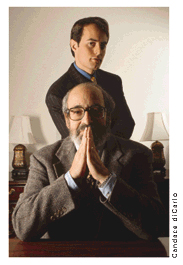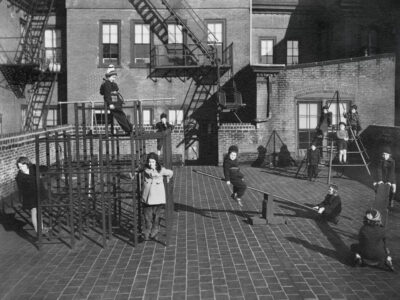
According to Dr. Alan Charles Kors, the professor and undergraduate curriculum chair of history who recently co-founded the Foundation for Individual Rights in Education (FIRE), the ultimate aim is to go out of business.
“The goal of FIRE,” he says, “is to eradicate itself by ending the abuses of power that now dominate American academic life.” Kors doesn’t see that happening anytime soon, however, which is why he and Boston attorney Harvey Silverglate, his fellow scourge of “mandatory thought-control,” are planning to use FIRE to fight what he calls “the current assault on liberty and dignity on campuses.”
Kors is no stranger to this debate. Long before he and Silverglate wrote The Shadow University: The Betrayal of Liberty on America’s Campuses, published in 1998, he had been representing students he felt had been unfairly treated by university judicial codes and otherwise attacking what he saw as campus attempts at thought-control. His most famous student defendant was Eden Jacobowitz C’95, who in 1993 was accused of racial harassment for shouting: “Shut up, you water buffalo! If you want to party, there’s a zoo a mile from here!” to a group of late-night revelers. The charges against him were eventually dropped, but not before Penn had become a much-derided national emblem of political correctness.
Since that time, Kors believes, Penn has “undergone a sea change in its culture, freedom, student equality and due process,” so he is no longer inveighing against the University administration. “Penn is one of the great examples of how sunlight really is the best disinfectant,” says Kors, who was largely responsible for taking Jacobowitz’s case to the national media. “Penn took an international hit during the Water Buffalo case. But the cumulative effect of that was the sense that it had to change the substance that had produced such a public perception.” He credits the improved climate to actions and statements made by the trustees and by President Judith Rodin CW’66, and to the hiring of Dr. Valarie Swain-Cade McCoullum as vice provost for University life.
The Shadow University contains some fiery rhetoric, and its critics argue that it presents a selective account of history. But if the number of pleas for help Kors says it has generated is any indication, then there are plenty of other colleges around the country engaging in the sort of “thought control” he once saw at Penn. Since the book’s publication, Kors says that he and Silverglate have each been getting 20 to 25 requests a week—letters, e-mails and phone calls, from students and faculty around the country—all claiming to be “victims of the same kinds of injustices and phenomena that we had described in our book.”
The problem, Kors explains, “is that there is no way to know which claims are legitimate and which aren’t.” After all, “there really are people who are extremely unprofessional and who are fired for cause. There are people who are treated certain ways independently of their politics or their beliefs, because of the way they do things, and there are people who have violated perfectly valid professional rules of conduct or student codes of conduct. And it is very easy for people to claim to be victims of any set of phenomena under the rubric ‘political correctness’ who really have been treated the way they were for wholly different reasons.”
Since both he and Silverglate have jobs, families and lives, he says, the “obvious solution” was FIRE, which can examine the requests for assistance “so that we can wage this struggle for liberty and due process and respect of conscience on our campuses with accurate, vetted, appropriate cases.” FIRE’s office is in Center City Philadelphia, and its Web site is (www.thefire.org).
In addition to Kors (president) and Silverglate (treasurer), who handle all cases on a pro-bono basis, FIRE has a full-time executive director—Thor L. Halvorssen C/G’96, a former student of Kors’ who saw political combat at Penn as editor of the conservative student publication The Red and Blue—as well as a full-time staff member. FIRE’s board of advisers represents a broad swathe of political ideologies—including Boston talk-show host David Brudnoy, writer Nat Hentoff, civil-rights leader Roy Innis, lawyer and social critic Wendy Kaminer, and philosopher John Searle—and it has received funding from various foundations and individuals, including one Penn trustee whom Halvorssen declined to name.
Halvorssen—whose tasks include scheduling Kors’ many speaking engagements around the country—says he provides the operational know-how, while Silverglate supplies the legal savvy and Kors “brings in the moral, philosophical, theoretical and every other ‘ism’ and ‘ical’ you can imagine.”
For Kors and Silverglate, the problem on college campuses is not so much individual administrators but the whole system—one that Kors describes as “driven by the identification of people at universities not as individual minds, souls and sensibilities but as embodiments of blood and history.” As an example, he points to a policy statement at West Virginia University a few years back that directed faculty and students to use “gender-neutral language in speaking about their life’s partners.”
“You couldn’t say, if you were a professor, ‘My wife’ or ‘My husband,’” recalls Kors. “You couldn’t say, if you were a student, ‘My girlfriend’ or ‘My boyfriend.’ You had to use gender-neutral language so as not to privilege one form of sexuality. Anybody’s free to advise someone to do that; I don’t care. But that was a policy statement.” Kors advised the faculty there to contact the local chapter of the American Civil Liberties Union, which threatened to take the issue to the news media. The policy was rescinded.
While private universities “have the right to organize themselves around the principles they choose,” Kors acknowledges, “they don’t have the right to commit fraud and violation of contract. What most universities do is they promise academic freedom, and they deliver selected academic oppression.
“What [they could say] is, ‘We believe that your sons and daughters are the racist, sexist, homophobic, Eurocentric progeny of an unjust America—and for $30,000 a year, we’ll assign rights unequally, engage in a redistribution of rights toward the end of the righting of historical wrongs and undertake by coercion the political reeducation of your children,’” says Kors. “Let them advertise that, and then people who voluntarily accept it are exercising their individual rights. We just don’t think a lot of people would accept such an invitation.”




